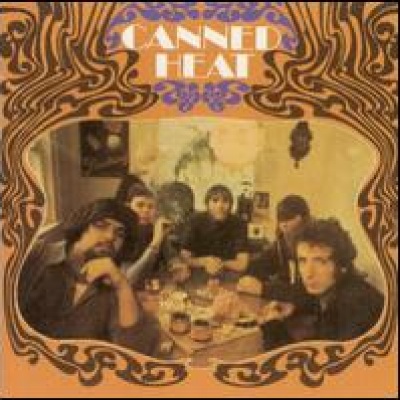
Canned Heat
by Lindsay PlanerThis debut long-player from Canned Heat was issued shortly after their appearance at the Monterey International Pop Music Festival. That performance, for all intents and purposes, was not only the combo's entrée into the burgeoning underground rock & roll scene, but was also among the first high-profile showcases to garner national and international attention. The quartet featured on Canned Heat (1967) includes the unique personnel of Alan "Blind Owl" Wilson (guitar/vocals), Larry "The Mole" Taylor (bass), Henry "Sunflower" Vestine (guitar), Bob "The Bear" Hite (vocals), and Frank Cook (drums). Cook's tenure with the Heat would be exceedingly brief, however, as he was replaced by Aldolfo "Fido" Dela Parra (drums) a few months later. Although their blues might have suggested that the aggregate hailed from the likes of Chicago or Memphis, Canned Heat actually formed in the Los Angeles suburb of Topanga Canyon, where they were contemporaries of other up-and-coming rockers Spirit and Kaleidoscope. Wilson and Hite's almost scholarly approach created a unique synthesis when blended with the band's amplified rock & roll. After their initial studio sessions in April of 1967 produced favorable demos, they returned several weeks later to begin work in earnest on this platter. The dearth of original material on Canned Heat was less of a result of any songwriting deficiencies, but rather exemplifies their authentic renderings of traditionals such as the open-throttled boogie of "Rollin' and Tumblin'" -- which is rightfully recognized as having been derived from the Muddy Waters arrangement. Similarly, a rousing reading of Robert Johnson's "Dust My Broom" is co-credited to Elmore James. Blues aficionados will undoubtedly notice references to a pair of Howlin' Wolf classics -- "Smokestack Lightning" as well as "I Asked for Water (She Gave Me Gasoline)" -- as part of the rambling "Road Song." While decidedly more obscure to the casual listener, Eddie "Guitar Slim" Jones "Story of My Life" is both a high point on this recording, as well as one of the fiercest renditions ever committed to tape. Until a thorough overhaul of Canned Heat's catalog materializes, this title can be found on the Canned Heat/Boogie With Canned Heat (2003) two-fer that couples this title with their 1968 follow-up.
